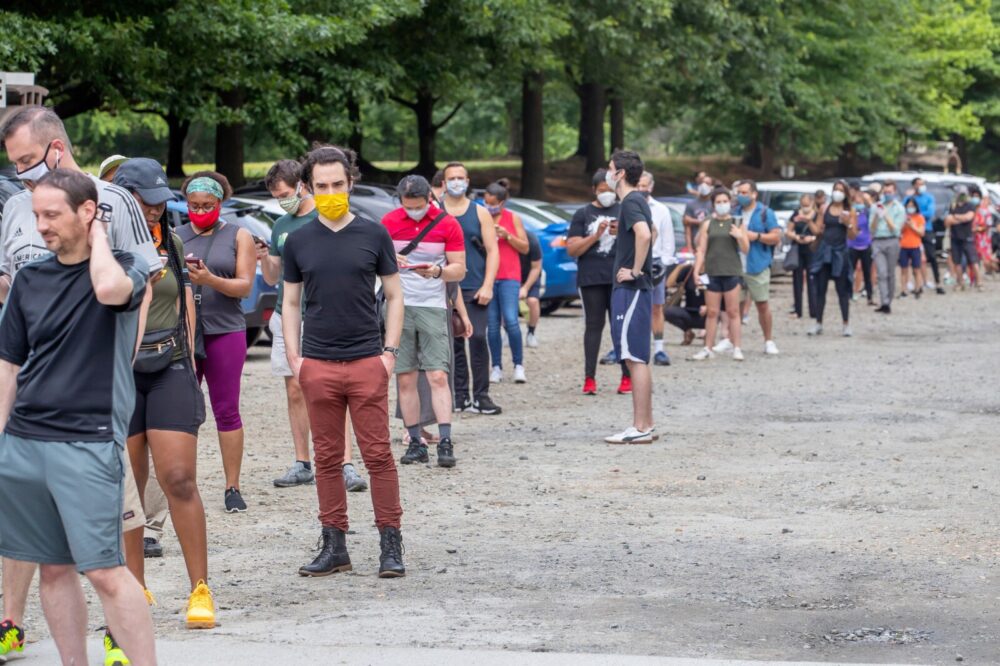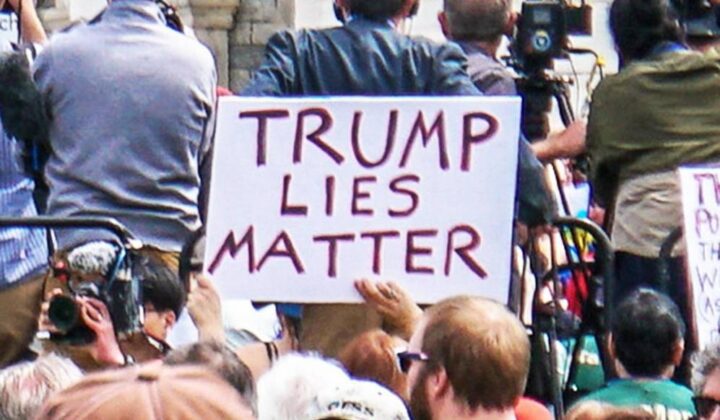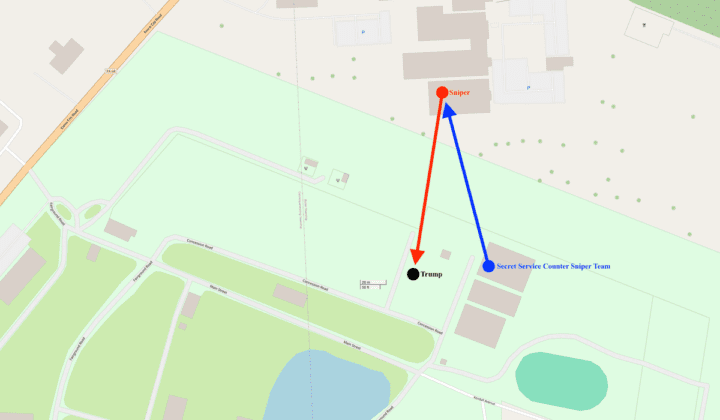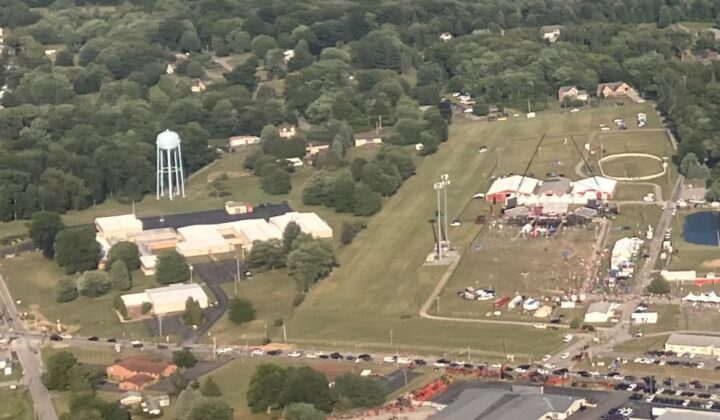A Voting Debacle in Georgia
The June 9th primary elections in Georgia dissolved into chaos. Some people stood in line for as long as six hours waiting to cast their ballot, while many absentee ballots were incorrectly processed or not processed at all. These failures were the result of an overload on voting infrastructure caused by a shortage of poll workers due to under-funding and COVID-19, people receiving their absentee ballots late, and new voting machines—called Ballot Marking Devices – that often glitched. Even when the machines worked, they were not evenly dispersed throughout precincts. According to the voting-rights organization Free Fight, black communities received fewer machines than their population required, which also increased waiting times.
Kristen Clarke, president of the Lawyers’ Committee for Civil Rights Under Law, stated that her organization received countless calls about insufficient paper ballots, malfunctioning equipment, wait times to vote longer than several hours, and closed polling stations. Approximately three-quarters of the callers were African-American. LaTosha Brown, a black voter in Atlanta and co-founder of Black Voters Matter, compared a white Atlanta suburb with her own predominantly black community, saying “I come over to this side of town, and white folks are strolling in. On my side of town, we brought stadium chairs.” Brad Raffensperger, Georgia’s Secretary of State, said that in certain precincts in Fulton and DeKalb counties, the polling process was “unacceptable.” These counties have a black population of 44% and 54.9%, respectively.
- What is the history of voting problems in Georgia?
Aside from the problems related to COVID-19, Georgia has seen its share of serious voting and electoral issues in its recent and not-so-recent past. Like other Southern states, Georgia instituted Jim Crow laws in the late 19th and early 20th century that mandated segregation and severely restricted the ability of black people to vote. The Voting Rights Act (1965) was passed to do away with these racially motivated restrictions. However, its partial invalidation in 2013 by the Supreme Court has allowed many states to create newer, more sophisticated voting obstacles like strict voter ID laws, “exact match” laws, and restrictions on early voting that disproportionately impact immigrants and people of color. These measures have been justified by highly exaggerated fears of voter fraud, and Georgia has been a leading state in this effort.
Gov. Brian Kemp, who was Georgia’s Secretary of State during his own race for governor in 2018, struck hundreds of thousands from the voting rolls on grounds that voters had moved, despite the fact that they still lived at the address they registered at. On top of this, Kemp denied over 50,000 voter applications based on small differences in the spelling of their names. Eighty percent of the withheld applications belonged to people of color. Along with the closure of certain polling sites and the relocation of other polling sites further away from minority neighborhoods, these actions made black voters 20 percent more likely to miss the 2018 election. Gov. Kemp won his election by only 55,000 votes.
- What does this mean for the November elections?
If the travesty in Georgia is any indicator, there could be an electoral catastrophe, not only in Georgia, but throughout the United States come November. Indeed, Wisconsin, Ohio, and Pennsylvania have also experienced problems this primary season with absentee ballots that never arrived, poor access to polling places, and insufficient numbers of poll workers. And apart from these logistical hurdles stemming from the pandemic, states are also confronting the threat of foreign interference (Georgia itself was a target of Russian state hackers in 2016), a president that may refuse to recognize the results if he loses, and the kind of voter suppression that we saw in Georgia. As our country faces one of its most consequential elections in history, the legitimacy of the result cannot be in question. But as the debacle in Georgia demonstrates, if the election result is close, people’s confidence in our electoral system should not be taken for granted.

General Milley Stands Up for an Apolitical Military
Last Thursday, Chairman of the Joint Chiefs of Staff, General Milley, apologized for taking part in the President’s photo op in front of St. John’s Church after federal law enforcement officers had used tear gas and rubber bullets to remove peaceful protesters from Lafayette Square. Milley’s presence, clad in full military fatigues, seemed to give a military stamp of approval to what was clearly a political event and raised concerns over the politicization of the armed forces. Milley’s apology came during his keynote address to the National Defense University, in which he reinforced the importance of an apolitical military and reaffirmed to the next generation of American soldiers the essential role of the military in safeguarding the Constitution. Alongside recent public statements from former Secretary of Defense Jim Mattis and former chairman of the Joint Chiefs of Staff, Admiral Mike Mullen, Milley’s apology reassured the American public that this indispensable feature of democracy remains intact.
- What does it mean to have an apolitical military?
It is essential that the military remain apolitical so that it can preserve civilian trust in its ability to defend the nation without fears of partisanship. Officers in the armed forces take no oath to a single party or leader; their responsibility is to our democracy and its institutions. This means that while a professional officer corps must follow orders from its chain-of-command, it cannot make political displays of allegiance, especially when in uniform at a campaign-style event. The capacity for officers to obey and advise orders from the executive in a manner aligned with the good of society is one of the central pillars of military professionalism.
In the United States, civilian control of the military dates back to the days of George Washington. In 1783, upon securing victory against the British, Washington returned to the Continental Congress and resigned his commission as Commander-in-Chief, thereby ensuring that representatives accountable to the People would remain in control of the military. Washington understood that the only way to simultaneously maintain a democratic government and an effective, neutral military was to divide them, giving civilians (like the President and Secretary of Defense) supreme authority and the armed forces restricted autonomy. This enables the military to be strong enough to protect civilians against external threats, yet not so strong as to ignore civilian leadership.
- What is the danger of a politicized military in the US?
The danger is not about weakening the principle of civilian control of the military. That principle remains ironclad—after all, President Trump is a civilian! The real danger is about the politicization of the military. And recent drives to politicize the military include urging sailors to lobby Congress on his behalf, sending troops to the border as a political statement to prevent an unsubstantiated immigrant “invasion”, and utilizing funds appropriated for the military to build a border-wall. This underscores both the importance and necessity of Milley’s statement to maintaining an apolitical military.
All over the world, illiberal regimes take advantage of politicized militaries to benefit their own appetites for power. In Russia for example, healthy civil military relations have been replaced by a form of superpresidentialism. President Vladimir Putin guides a politicized military, making sure that officers are loyal to him and his administration rather than to a Constitution. This allows the state to exercise force with no regard for accountability or transparency. Unfortunately, western democracies are not immune to this disease, and they must be vigilant to ensure that the military remains apolitical, allowing citizens to maintain trust in the government’s ability to govern and the military’s ability to defend.

Protests in America Spread to the World
The protest movement against police brutality and racism catalyzed by the murder of George Floyd has not only inspired action in American cities but cities all over the world. London, Paris, Brussels, Berlin, Tel Aviv, Rio de Janeiro, and many more have seen protests, at times rallying thousands or tens of thousands, in support of the Black Lives Matter movement in the US and against enduring issues with policing and racial discrimination in their own countries. For instance, protests in Paris highlighted the case of Adama Traoré, a Malian French Man who died in police custody in 2016; in Rio de Janeiro, protestors were motivated by the many killings of Afro-Brazilian men in favelas by police; in Brussels, protestors were driven by Belgium’s ongoing reluctance to recognize its atrocities in the Congo. And the movement has also moved from the streets into such disparate environments as corporate boardrooms, celebrity culture, and a mural in Idlib, Syria. Real cultural and social change has swept the globe.
- What does this say about America’s role in the world?
Much of the free world, whether it would acknowledge this fact or not, still looks to the United States as the world’s great democracy. As such, many democratic nations are both outraged by the failure of America to live up to its promise and inspired by the millions of Americans who strive to ensure that it will. Additionally, democratic countries like France or the UK are more inclined to see America’s problems as their own because of their common investment in liberal-democratic values and way of life.
Meanwhile, as always, there are authoritarian countries that have utilized the protests to distract from their oppressive systems. Iran and China have criticized American racism despite the severe repression of minority religious and ethnic groups like the Bahai or Uyghurs within their own borders. Authoritarian states tell their citizens that the promise of American democracy is an illusion to stymie the people’s hopes that a truly democratic alternative is possible. And this pattern of behavior is not without historical precedent. During the Cold War, the USSR devoted considerable resources to highlighting racism in America. The fact that this behavior continues reveals how these authoritarian countries still view the very real example of American democracy as a threat to their power.
- What do these protests tell us about how a democracy should reckon with its past?
In addition to the US with confederate monuments and iconography, recent protests have led to dramatic reckonings in other countries with the historical memory of racism, slavery, and colonialism. In the UK, a statue of slave-trader Edward Colston was thrown into the harbor while In Belgium, statues of King Leopold II, responsible for the deaths of millions of Congolese, have been defaced.
However, it is one thing to remove a statue of someone whose primary claim to fame is the perpetuation of oppression; it is something quite different when what they’re most known for is more laudable. A statue of Winston Churchhill has been boarded up for its own protection in London’s Trafalgar Square. Yes, Churchill held some views that we may cringe at today, but he played a crucial role in the defeat of fascism, among many other accomplishments. And in the US, Thomas Jefferson was a slave owner, but he was also one of our nation’s most influential founding fathers and the author of the Declaration of Independence. We commemorate men like Churchill and Jefferson despite their mistakes, while confederate figures like Robert E. Lee and Jefferson Davis are commemorated by their admirers for their mistakes, namely, rebelling against their country to maintain a brutal system of slavery. This is a crucial distinction.
Statues are not only history lessons. They venerate important figures to shape national identity and inspire citizens to embody the best qualities of those figures. With this in mind, in addition to removing monuments to traitors like Robert E. Lee, democracies should look to erect more memorials to a greater diversity of past heroes, ensuring that individuals like Harriet Tubman or John Brown get the recognition they deserve.





